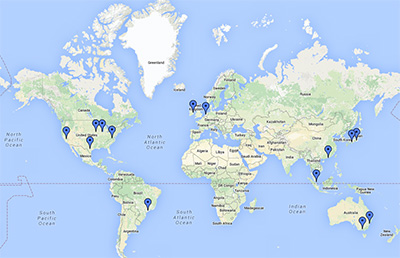News
Microsoft To Expand Its European Service Regions Next Year
Microsoft has plans to expand its datacenter capacity for delivering services in both the United Kingdom and Germany, per announcements made this week.
In the U.K. region, the expansion will support Microsoft Azure services, as well as Office 365 services, sometime in late 2016. Further expansion to support Microsoft Dynamics CRM services will happen "shortly thereafter," a Microsoft press release explained.
Microsoft already has a North Europe Region datacenter located in Dublin, Ireland. That facility will get an expansion, along with a West Europe facility in Amsterdam. However, the U.K. addition announced this week will be a new datacenter for that region. Microsoft won't say where it's located.
"Microsoft is not disclosing details on the location of the Microsoft Cloud U.K. regions at this time," a spokesperson for the company indicated, via e-mail.
Even though we don't know where the new U.K. facility is located, it will still ensure "data residency for customers in the UK." It will support more local data backup and recovery operations. Potential latency issues will be reduced, Microsoft claims. Microsoft also plans to offer its ExpressRoute service from the region, which provides a means for organizations to establish private Internet connections.
In Germany, Microsoft will open two new datacenter regions. One will be located in Magdeburg, while the other will be in Frankfurt am Main. These new datacenters also will be used to offer Azure, Office 365 and Dynamics CRM Online services, with availability expected in the "second half of 2016," according to Microsoft's announcement.
 [Click on image for larger view.]
Microsoft's Azure datacenter locations. Source: Google Maps, accessed Nov. 11, 2015.
[Click on image for larger view.]
Microsoft's Azure datacenter locations. Source: Google Maps, accessed Nov. 11, 2015.
Microsoft will be trying something new in Germany by using the services of a so-called "data trustee." The company will work with T-Systems, a Deutsche Telekom subsidiary, on certain data storage responsibilities. Microsoft, a U.S.-based company, is required to follow U.S. laws, which currently follow non-transparent procedures regarding data privacy protections. However, in its German regions, Microsoft will have to go through this data trustee to get access to the stored data.
"Microsoft will not be able to access this data without the permission of customers or the data trustee, and if permission is granted by the data trustee, will only do so under its supervision," Microsoft's announcement explained.
Microsoft has claimed compliance with the European Union's Data Protection Authorities regarding EU privacy laws. EU agencies have been working to achieve one big privacy approach across all EU-member countries. Current EU Model Clause regulations typically require that data be stored locally per country. But Microsoft took a somewhat different route in the case of Germany with this data trustee approach.
"Microsoft examined multiple markets around the world and met with many customers to get feedback on their needs for public cloud," the spokesperson explained. "Their input resulted in our decision to deliver Microsoft cloud services with a data trustee in Germany to provide greater customer choice. We remain committed to delivering cloud services that meet our customers' needs for flexibility and choice."
The German datacenters will "specifically address organizations and enterprises operating in data-sensitive areas such as the public, financial or health sector," Microsoft's announcement indicated.
Microsoft claims to have invested more than $15 billion so far to build out its cloud services infrastructure worldwide. Privacy protections in Europe have posed some regulatory hurdles for Microsoft along the way. However, there also have been some trust issues, especially following U.S. National Security Agency spying disclosures. Documents disclosed by former NSA contractor Edward Snowden showed that Microsoft was an early participant in an NSA PRISM data harvesting program, for instance.
That issue, along with the European Court of Justice's recent rejection of the U.S. Safe Harbor Framework for ensuring privacy when transferring data with the United States, was highlighted last month by Brad Smith, Microsoft's president and chief legal officer. In a blog post, Smith argued for privacy to be dependent on a country's local laws. He admitted, though, that it's a complex issue with private information being stored worldwide via the Internet.
Microsoft is currently contesting a U.S. warrant to search a customer's e-mail data that got stored in Microsoft's Dublin facility. The company filed an appeal in December 2014 with the U.S. Second Circuit Court after being found in contempt of court for not handing over the information.
About the Author
Kurt Mackie is senior news producer for 1105 Media's Converge360 group.